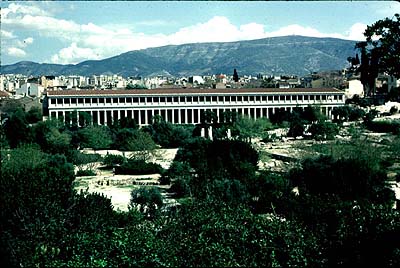|
|
Daily Schedule

Stoa of Attalos in the Athenian Agora
-
Review: o-declension (2nd decl.), nominative
case, and present, future, imperfect, and aorist tenses, active
and middle
-
Grammar: what is the subjunctive mood; forms
of the present and aorist subjunctive; uses of the subjunctive:
hortatory, deliberative, purpose
- Hwk: 1) write out the declension of ho nostos "homecoming"
and to ergon "deed"; conjugate in the present, future,
imperfect, and aorist indicative and present and aorist subjunctive:
bouleuo (I deliberate, plan), polemeo (I make war), and
psephizomai (I vote)
2) work on the vocabulary for chapter 21a-b
3) Ex 21 beta (1-10), gamma, delta (1-3)
4) Do the exercises in Ariadne for
Chapter 22 images; read the culture sections for Chs 21-22
5) Read the Greek reading passage for Ch 21a
6) Begin Philip's story of his healing at Epidauros and return home:
write a one paragraph summary of the readings for Chapter 17
-
Review: 3rd declension, genitive case, infinitives
-
Grammar: uses of the subjunctive: indefinite
or general clauses; indirect questions and indirect statements with
hoti
-
Hwk: 1) write out the declension of ho rhetor
"the speaker" and he polis "the city-state"
2) work on vocabulary for Ch 22a-b
3) Ex 22 gamma (1-5) delta (1-5)
4) Ariadne Ch 22 writing
5) Re-read Pericles' speech (Ch 21b) and read Greek reading for Ch
22a
6) Continue your summary of ho nostos tou Philippou (Ch 19)
7) Explore authors, genres, or time periods that you want to do
your commentary on
Day 5 Review and Research Day
-
Summary: ho nostos tou Philippou due
at 5 p.m.
-
Hwk: 1) work on vocabulary for Ch 23
2) Ex 23 alpha (9-15), beta (1-5)
3) Ariadne Chapter 22 writing
4) Read culture essay for Chapter 23, "The Peloponnesian War: The First Phase 431-421 BCE"
4) Read Greek reading for Ch 23a (we'll sight-read 22b in class)
5) Read through your chosen author to find the passage you want to
do; consult the library to find the works that you plan to consult
in doing the commentary project
Day 7 Chapter 24b
-
Commentary: bibliography due
-
Review: future and aorist passive
-
Grammar: irregular comparative adjectives
-
Culture: Greek Education
- Hwk: 1) synopsis of paideuo
"I educate" in the 3rd plural passive (leave the optative
blank)
2) learn vocabulary for Ch 24b; memorize the irregular comparative
adjectives, p. 134-35
3) Ex 24 delta
4) Ariadne, Ch 24 Images
5) Read Greek reading for Ch 24a and the first two paragraphs of 24b
6) Begin work on your commentary: work on translating and writing notes for the first ten lines of your text
Day 10 Midterm (Chapters 21-25a)
-
Commentary: text, translation, and commentary due at 5 p.m. Please turn in a copy of the Loeb text along with your translation and commentary.
- Review: accusative case
-
Grammar: optative in indirect statements and
questions; adverbial accusative, accusative of respect
-
Culture: Croesus and Lydia
-
Hwk: learn vocabulary for Chapter 26a-b
Read Ch 26 culture essay: "Shame and Guilt"
Ex 25 iota (4-8)
Read Greek reading for Chapter 26a-b
Day 12 Chapter 26a-b, 27a
-
Grammar: conditions; adverbial accusative,
accusative of respect, and the accusative absolute; perfect middle
- Review: genitive case, verbs that take the genitive
-
Culture: shame and guilt in ancient Greece
- Hwk: learn vocabulary for Ch 26b-27a
Ex 26 alpha, gamma (1-6);
Read Ch 27 Greek culture essay: Signs, Dreams, and Oracles
Read Greek Reading for Chapter 27a-b
-
Commentary: introduction, text, translation, commentary, appreciation/interpretation due at 5:00 p.m.
-
Grammar: perfect middle of verbs with stems
ending in a consonant; perfect reduplication and augment; perfect
active
-
Hwk: learn vocabulary for Ch 27b-28a
Ex 27 delta (5-10), theta, kappa (1-6), Ex 28 epsilon
synopsis of haireo "I take," middle "I choose": in the 1st plural middle
Read Ch 28 Greek culture essay: Rationalism and Mysticism
Read Greek reading for Chapter 27b-28a
Day 15 Reading Day
- Grammar: review
- Readings: end of the story of Croesus; the story of Nicodemus
- Hwk: review vocabulary for Ch 25-26;
synopsis of hiemi "to let go, send" (3rd plural, active)
conjugate eimi "to be" in the present, future, and
imperfect, and conjugate erchomai (present), eimi "I
will go" (future, imperfect), and elthon (aorist);
Read fable of Babrius and scene from Aristophanes' Clouds
Continue working on your symposium project
Day 16 Reading Day
- Grammar: review
- Readings:
- Hwk: review vocabulary for Chapters 27-28
Day 17 Final Exam (Chapters 25-28 plus other readings)
- Greek Symposium (Lytle House, 5:30ish)
Day 18 no class
- Final revision of Commentary Project due
|